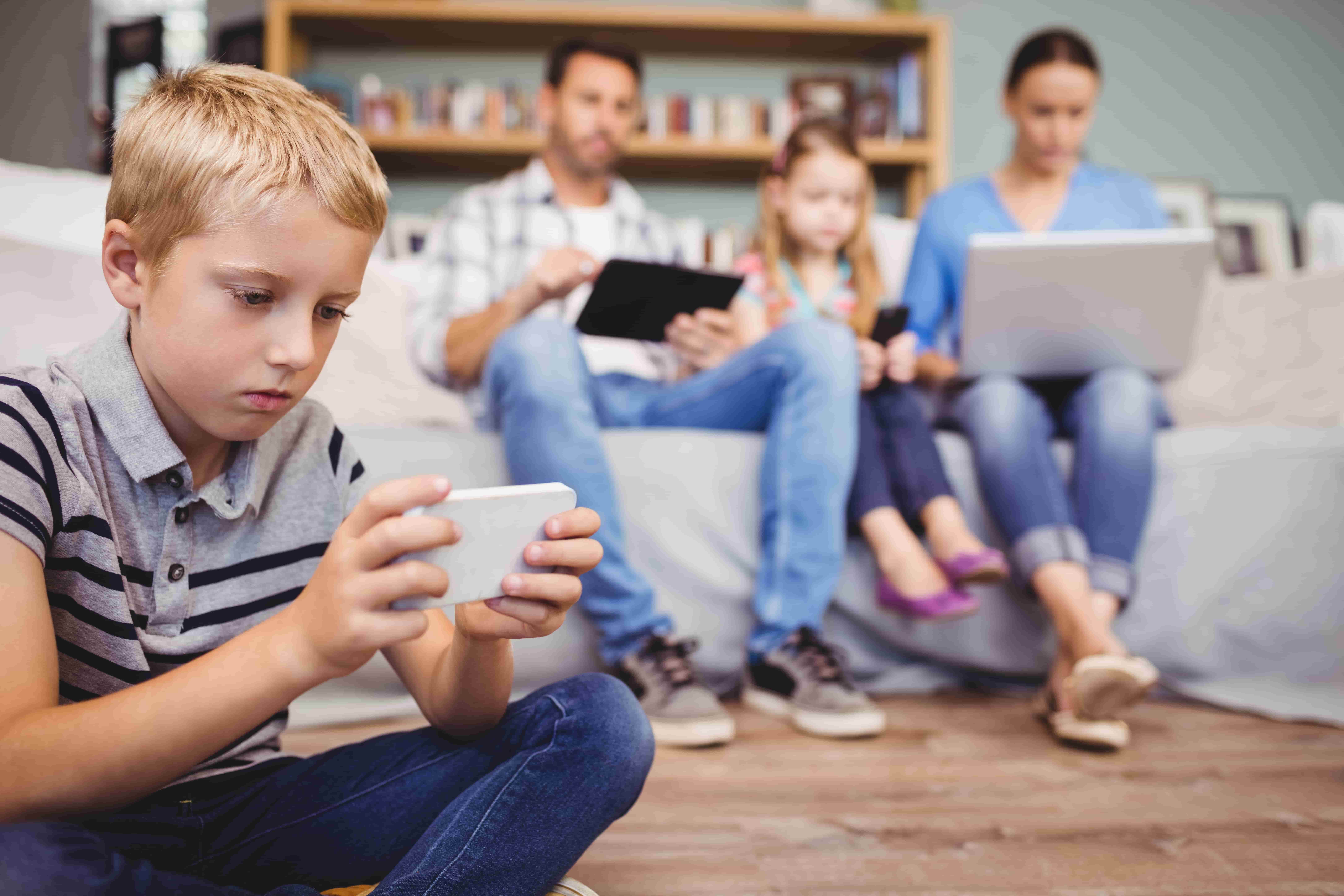
How Too Much Screen Time Impacts Interpersonal Development
Is the art of conversation becoming a lost skill? The next time you go to a social place (a park, a stadium, a club, etc), take a moment and look around—if you can see a group of young people hanging out yet each person is absorbed in their phone then you know your answer. We’re living in a digital age where our devices are redefining not just how we communicate, but who we are as social beings.
A question worth asking is: What happens to our social skills when face-to-face conversations are replaced by too much screen time?
The Rise of Screen Dependency
It’s no secret that screen time has skyrocketed. In fact, a report from Common Sense Media found that teens spend an average of over 9 hours a day on screens, excluding schoolwork. This figure highlights the significant amount of time teens dedicate to screen-based activities, potentially at the expense of face-to-face interactions and interpersonal development. The negative effects of screen time on child development are becoming increasingly evident, as excessive screen use can hinder social skills, emotional growth, and physical activity.
Dr. Jean M. Twenge, Professor of Psychology at San Diego State University (SDSU) and author of iGen, emphasizes, “The more time teens spend looking at screens, the more likely they are to report symptoms of depression.” Twenge has spent years studying generational shifts, and her findings point to a worrying trend: face-to-face social activities among younger generations are declining, with many opting for the comfort of their digital devices instead.
Even more concerning is that our brains are adapting to this digital world. Dr. Sherry Turkle, a professor at the Massachusetts Institute of Technology (MIT), has studied how technology changes our ability to connect. In her book Reclaiming Conversation, she warns, “We are being silenced by our technologies as if they’ve stopped us from talking.” This silence may have profound effects on how younger people develop crucial social and interpersonal skills such as expressing emotions clearly, resolving conflicts, engaging in meaningful face-to-face discussions, sharing stories, and confidently voicing opinions.

What Science Says: The Impact on Social Skills and Interpersonal Development
The consequences of growing up in a screen-heavy world extend far beyond reduced small talk. Excessive screen time can significantly impact social skills and interpersonal development, which are formed through real-world interactions where we learn to read facial expressions, interpret tone, and engage in active listening.
A study conducted by researchers at the University of California, Los Angeles (UCLA) examined the impact of screen time on children's ability to recognize nonverbal emotional cues. In this study by UCLA, 51 preteens attended a five-day overnight nature camp where the use of electronic devices was prohibited.
Their performance was compared to a control group of 54 peers who continued their usual media practices. Both groups were assessed before and after the five-day period on their ability to interpret emotional states from photographs of facial expressions and videotaped scenes with verbal cues removed.
The results indicated that the camp participants showed a significant improvement in recognizing nonverbal emotional cues compared to the control group. This suggests that time away from screens, coupled with increased face-to-face interaction, can enhance children's understanding of nonverbal emotional cues.
Dr. Larry Rosen, Ph.D., a psychologist who studies the impact of technology on behavior also points out that social media is a major cause of increased anxiety. His research, published in Psychology Today, indicates that people frequently check their devices not just for pleasure but because of their anxiety about missing out on something important in their digital world.
This behavior is driven by a need to constantly ‘check-in’ and can lead to a sense of inadequacy and envy as users compare their lives to the curated highlights of others on social media. When combined with a lack of face-to-face social experiences, it can heighten social anxiety and make young people feel less confident and more disconnected in real-world interactions.
The Hidden Cost of Screen Time on Social Connection
Have you ever heard of “phubbing”? It’s the habit of ignoring the person right in front of you in favor of your phone. On the surface, it might seem harmless—after all, checking a quick message or scrolling through updates is a part of everyday life. However, studies show that screen time and mental health are closely linked, with excessive phone use contributing to feelings of disconnection, anxiety, and reduced emotional well-being.
But if you pay close attention, you will find that “phubbing” has deeper consequences. It chips away at relationship satisfaction and leaves people feeling isolated and undervalued. Now for a moment imagine that you’re at a dinner table with close friends or family, and instead of meaningful conversations, everyone’s focus is locked onto their screens. Moments which were meant for social connection are lost and are replaced by your social media apps.
We are inherently social beings and have lived with genuine, face-to-face interactions for centuries. Ironically, the very technology that was created to bring us closer is often what drives us apart.
Dr. Jean Twenge, highlights a worrying trend: today’s young people (Gen Zs and Gen Alpha) are increasingly choosing screens over real-world experiences. They’re less likely to date, spend time with friends, or even go on a random long drive with friends and family compared to previous generations (Millennials). This growing preference for virtual interactions over in-person engagements has reshaped the way younger generations connect and made it more challenging to build and maintain deep, fulfilling relationships.

Strategies for Reclaiming Face-to-Face Connection
If screens are affecting your social skills and connections, remember that you’re not alone. Making a change can feel challenging but taking intentional steps can help you rediscover real-world interactions. Here are some practical strategies to help you reconnect:
Practice Intentional Disconnection
It’s tempting to keep your phone nearby “just in case,” whether it’s for a work update or that scroll through social media to unwind. But those few glances often snowball into missed opportunities for connection.
Create “no-phone zones” in your home—spaces where screens are set aside to let meaningful conversations thrive. Start with the dining table or the living room.
Replace those moments with activities that foster connection. For example, during dinner, go around the table sharing the highlight of your day. Families who share tech-free meals experience deeper bonds and more open communication. Research about screen time shows that reducing device usage during shared moments significantly improves family dynamics and emotional well-being.
Related Article : How Screen Time from Cell Phones Ruin Relationships
Prioritize Real-Life Interactions
We know it’s easier to text or scroll, and after a long day, the idea of making the effort to engage in person might feel daunting.
Try committing to more in-person activities, like joining a local club, volunteering, or attending community events.
Start small and set achievable goals like grabbing coffee with a colleague or scheduling study breaks with a classmate. While there, focus on being fully present—put your phone away, listen actively, and ask thoughtful questions. Show the other person that you’re truly invested in the conversation.
Small, intentional interactions, like engaging in a group discussion or staying after a lecture to connect with peers can make a big difference in strengthening your network. Remember, meaningful connections are built one conversation at a time.
Use Technology Mindfully
Finding balance doesn’t mean cutting technology out of your life. It’s a fact that technology isn’t going anywhere, and cutting it out completely is an unrealistic approach, especially when work, family, and entertainment all live on your devices. However, addressing screen time problems is essential to maintain a healthy relationship with technology and ensure it doesn’t interfere with your well-being or personal connections.
Use technology with purpose, not out of habit. Dr. Larry Rosen recommends taking “tech breaks” throughout the day—moments where you consciously put down your device, reset, and recharge.
Our Jolt app makes this easier by helping you schedule these breaks, nudging you when it’s time to pause and blocking apps during your downtime to keep you on track. You can also appreciate your consistency by looking at your daily streaks in the app. Over time, these mindful pauses can boost your focus and leave you more present in face-to-face interactions.
Build Empathy Through Conversations
It’s easy to fall into surface-level interactions, especially when you’re used to quick WhatsApp texts or Instagram comments that don’t require much effort. Bad screen time habits can erode deeper connections, making it harder to engage in meaningful conversations and truly understand one another.
However, one of the most powerful ways to reconnect is by having deeper conversations. You need to shift your focus to deeper and more meaningful conversations. Instead of just hearing someone’s words, try to understand the emotions behind them.
When you talk to someone, ask open-ended questions like, “What’s been on your mind lately?” or “What’s the most exciting thing that’s happened this week?” Listen actively—put your phone away, make eye contact, and give the person your full attention. These small changes not only make others feel valued but also improve your own interpersonal skills over time and you will feel closer to the people around you.
Conclusion: A Call to Reflect and Act
It’s a no-brainer that our world is moving towards a more tech-savvy society and in the process the art of conversation may indeed be slipping away and is getting replaced by likes, emojis, and scrolling timelines. But it doesn’t have to be lost forever! By managing screen time for children, we can encourage meaningful interactions, promote real-world social skills, and preserve the value of face-to-face conversations in a digital age.
Just as our screens have reshaped our interactions with the real world, we have the power to intentionally reclaim the depth and richness of face-to-face connections. The shift doesn’t require grand gestures or sweeping changes.
It starts with the simplest choices: putting your phone down during dinner, asking a friend about their day, or just being fully present with the people around you. By taking small but deliberate steps, we can reintroduce depth, empathy, and meaning into our daily lives.
We can create a future where we balance technology with meaningful conversations, where our social skills flourish, and where genuine human bonds become our default mode once again.
As we go through this era of digital dependency, the question remains: Are we willing to make conscious changes to reconnect with one another in the real world? The choice to preserve and nurture our social skills starts with simple, everyday decisions—choosing presence over distraction, real laughter over digital emojis, and heartfelt conversations over hurried texts. After all, true connection is not just about communicating; it’s about understanding and being understood.
Read Also
3 Scientifically Proven Ways to Build New Habits
3 Simple Ways to Fix Digital Eye Strain for Heavy Screen Users
What is Circadian Rhythm & How is It Affected by Screen Time